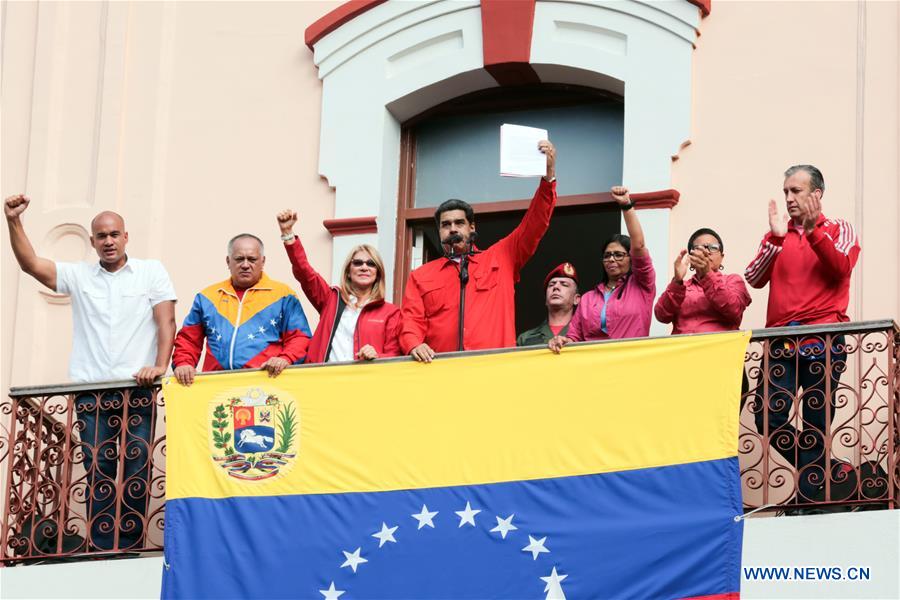
Image provided by Venezuela's Presidency shows Venezuelan President Nicolas Maduro (C) taking part in a rally in support of his government, at the Miraflores Palace, in Caracas, Venezuela, on Jan. 23, 2019. Venezuelan President Nicolas Maduro on Wednesday announced he was severing "diplomatic and political" ties with the United States after the U.S. authorities recognized the opposition leader Juan Guaido as the nation's interim president. (Xinhua/Venezuela's Presidency)
CARACAS, Jan. 23 (Xinhua) -- Venezuelan President Nicolas Maduro on Wednesday announced he was severing "diplomatic and political" ties with the United States after the U.S. authorities recognized the opposition leader Juan Guaido as the nation's interim president.
"I have decided to break diplomatic and political relations with the imperialist U.S. government," Maduro said in a speech to supporters gathered outside the presidential headquarters in Caracas.
"Out they go from Venezuela, enough of interventionism," said Maduro, who was accompanied by his cabinet.
He commanded all the U.S. diplomatic and consular personnel to leave the country in 72 hours, accusing Washington of orchestrating "an operation to impose, through a coup d'etat, a puppet regime in Venezuela."
The announcement came hours after U.S. President Donald Trump recognized Guaido as interim president in a statement issued by the White House. In addition, Trump has not ruled out the military option. He told reporters later in the day that "all options are on the table."
Despite of Maduro's strong response, U.S. Secretary of State Mike Pompeo said late Wednesday that U.S. diplomatic personnel in Venezuela would not leave, adding Washington would conduct diplomatic relations through the government of "interim president."
"The United States does not consider former president Nicolas Maduro to have the legal authority to break diplomatic relations with the United States," Pompeo said in a statement.
Earlier on Wednesday, during an opposition rally, 35-year-old Guaido, head of the opposition-controlled National Assembly, declared himself interim president of the Latin American country.
The opposition leader's claim also won support from Brazil, which recognizes Mr. Juan Guaido as President-in-Charge of Venezuela.
Brazil will politically and economically support the transition process for democracy and social peace to return to Venezuela," the foreign ministry said Wednesday in a statement.
Brazilian President Jair Bolsonaro, who is at Davos for the World Economic Forum, confirmed the statement.
"Along with the members of the Group of Lima, which have been, one by one, also recognizing this fact, Brazil will provide the necessary political support for this process," Bolsonaro said.
Back in Brasilia, Vice President Hamilton Mourao denied that the country would participate in an eventual invasion of Venezuela. "It is not of the nature of our foreign policy to intervene in other countries' internal affairs," Mourao said.
Thirteen of the 14 member countries of the Lima Group, except Mexico, signed a declaration on Jan. 4 in the Peruvian capital Lima to urge Maduro not to assume a second presidential term on Jan. 10, the date when Maduro was sworn in as president for another six-year term.
But not all Latin American countries back Guaido's self-proclaim.
"Our solidarity with the Venezuelan people and Nicolas Maduro, in these decisive hours," Bolivian President Evo Morales tweeted.
In addition, Jesus Ramirez Cuevas, the spokesman for Mexican President Andres Manuel Lopez Obrador, said Mexico "is analyzing the situation in Venezuela" and maintains "our position of neutrality in the Venezuelan conflict."
Via Mexico's local news channel, the spokesman said "there is no change in its diplomatic relations" with Venezuela nor with its government till now.
Unlike the United States and Brazil, the European Union voiced its support for the National Assembly of Venezuela presided by Guaido, but the bloc stopped short of recognizing him as head of state.
In a late night press release on Wednesday, the EU said that it "fully supports the national assembly as the democratically elected institution whose powers need to be restored and respected" and "the civil rights, freedom and safety of all members of the national assembly, including its President, Juan Guaido, need to be observed and fully respected."
Amid divided international reactions, Guaido has yet to win domestic military support. Venezuelan Defense Minister Vladimir Padrino Lopez on Wednesday tweeted that "the country's soldiers do not accept a president imposed in the shadow of dark interests or one that is self-proclaimed, outside of the law."
Meanwhile, Admiral Remigio Ceballos, chief of the strategic command of the Armed Forces, also voiced his support for Maduro on Twitter. "We are sovereign and loyal to our commander in chief, Nicolas Maduro Moros," the military leader tweeted.
First elected in 2013, Maduro won another term last year with 67.84 percent of the vote, pledging to strengthen the Bolivarian Revolution launched by former President Hugo Chavez.
For years, the United States has been implementing diplomatic pressure and economic sanctions to Venezuela. Right before Maduro's inauguration on Jan. 10, the U.S. Treasury Department imposed sanctions on seven Venezuelan individuals and 23 entities, accusing them of involvement in a corruption scheme.















